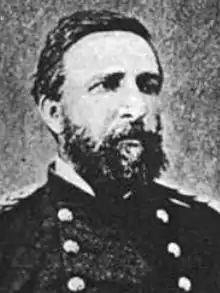Charles Henry Smith (Army Medal of Honor)
Brigadier General Charles Henry Smith (November 1, 1827 – July 17, 1902) was an American Civil War United States and Medal of Honor recipient.
Charles Henry Smith | |
|---|---|
 Charles Henry Smith, 1st Maine Volunteer Cavalry, c. 1865 | |
| Born | November 1, 1827 Hollis, Maine |
| Died | July 17, 1902 (aged 74) Washington, DC |
| Allegiance | |
| Service/ | |
| Rank | |
| Unit | 1st Maine Volunteer Cavalry |
| Battles/wars | American Civil War:
|
| Awards | |
| Signature | |
Personal
Smith was born in Hollis, Maine.[1] He taught school before the Civil War. He married Mary R L Livermore in 1850. She died on December 18, 1897 in Washington, D.C. He never remarried, and died in Washington also, on July 17, 1902.[2] He is buried in Arlington National Cemetery next to his wife.[3] His younger brother, George Washington Smith, served as a 90-day volunteer as a sergeant in Co I, 3rd Massachusetts Infantry, reenlisting in the 18th Massachusetts Infantry where he served from August 1861 to September 1864.
Military
During the Civil War, Smith was a member of the 1st Maine Volunteer Cavalry Regiment.[4][5] He was commissioned a Captain in November 1861 and took command of Company D. He served well and was promoted to Major on February 16, 1863. Promoted again March 26 to Lieutenant Colonel, he participated in the Stoneman 1863 raid. He commanded the regiment in Col. Douty's absence at Brandy Station assuming command after Douty's death at Aldie June 17, 1863 when he was promoted Colonel. He was breveted to Brigadier General on August 20, 1864 and took command of the brigade. He ended the war at Appomattox having commanded several brigades and a division.
He earned his Medal of Honor for his actions at the Battle of St. Mary's Church in October 1864.[6] Issued on April 11, 1895, his citation read:
The President of the United States of America, in the name of Congress, takes pleasure in presenting the Medal of Honor to Colonel (Cavalry) Charles Henry Smith, United States Army, for extraordinary heroism on 24 June 1864, while serving with 1st Maine Cavalry, in action at St. Mary's Church, Virginia. Colonel Smith remained in the fight to the close, although severely wounded.[6]
He remained in the army after the war and retired as a Colonel in 1891.
References
- The National Cyclopaedia of American Biography. VIII. James T. White & Company. 1924. p. 452. Retrieved January 27, 2021 – via Google Books.
- "Death of General C. H. Smith". Hartford Courant. Washington. July 18, 1902. p. 8. Retrieved January 27, 2021 – via Newspapers.com.
- FindAGrave.
- Hodsdon (1867), pp. 8.
- Dyer (1908), pp. 1216.
- USARCMH.
Bibliography
- Beyer, Walter Frederick (1905). Deeds of Valor (PDF) (1st ed.). Detroit, MI: Perrien-Keydel Co. pp. 318–319. OCLC 680527243.
- Dyer, Frederick H (1908). A Compendium of the War of the Rebellion (PDF). Des Moines, IA: Dyer Pub. Co. ASIN B01BUFJ76Q. OCLC 8697590.
- Federal Publishing Company (1908). Military Affairs and Regimental Histories of Maine, New Hampshire, Vermont, Massachusetts, Rhode Island, Connecticut, Pennsylvania, And Delaware (PDF). The Union Army: A History of Military Affairs in the Loyal States, 1861–65 – Records of the Regiments in the Union army – Cyclopedia of battles – Memoirs of Commanders and Soldiers. I. Madison, WI: Federal Publishing Company. p. 555. OCLC 694018100.
- Heitman, Francis Bernard (1903). Parts I and II. Historical register and dictionary of the United States Army : from its organization, September 29, 1789, to March 2, 1903. I. Washington, DC: Government Printing Office. p. 1069. ISBN 9781333789817. OCLC 983265560. Retrieved August 30, 2016.
- Hodsdon, John L, Adjutant General (1867). Annual report of the Adjutant General of the State of Maine, 1861-1866. Augusta, ME: Stevens & Sayward. p. 1346. OCLC 866320784.
- Maine Gettysburg Commission (1898). Maine at Gettysburg: Report of Maine Commissioners Prepared by the Executive Committee (PDF). Portland, ME: The Lakeside Press. p. 694. OCLC 6079300.
- Tobie, Edward Parsons, Jr (1887). History of the First Maine Cavalry 1861–1865 (PDF). Boston, MA: The First Maine Cavalry Association. p. 735. OCLC 02013163. Retrieved August 2, 2018.
- "Lewellyn G. Estes – Recipient". The Hall of Valor Project. Sightline Media Group. Retrieved August 30, 2016.
- "Charles Henry Smith". FindAGrave.com. Find a Grave. Retrieved August 9, 2020.
- "Civil War (Recipients M-Z)". Medal of Honor Recipients. US Army Center of Military History. Retrieved August 6, 2020.
External links
- 1st Maine Cavalry Living History Organization
- 1st Maine Cavalry Regimental Standard reproduced by Steven Hill.
- History of the 1st Maine Cavalry at Google Books (downloadable for free)
- FamilySearch – 1st Regiment, Maine Cavalry
- The Civil War Archive – Maine 1st Regiment Cavalry
- Maine Memory Network – 1st Maine Cavalry